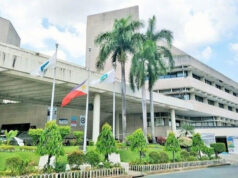THE Asian and Development Bank (ADB) said its new President Masatsugu Asakawa assumed office on Friday.
In a statement, the multilateral lender said Mr. Asakawa, special advisor to Japan’s Prime Minister Shinzo Abe, succeeded Takehiko Nakao, who stepped down on Thursday.
Mr. Asakawa will sit as the 10th President of ADB through November 2021 and finish Mr. Nakao’s unexpired term. Mr. Nakao served beginning April 2013, having been re-elected in 2016 to another five-year term.
“I am honored to assume the role of ADB President and to begin working in close cooperation with our 68 member-countries. ADB has been a trusted partner of the region for more than half a century, supporting strong growth that has improved the lives of people across Asia and the Pacific. I will strive to ensure ADB remains the preferred choice of its clients and partners,” Mr. Asakawa was qutoted as saying.
ADB said Mr. Asakawa held various senior positions at Japan’s Ministry of Finance and has specialized in development policy, foreign exchange markets and international tax policy.
The Manila-based ADB said Mr. Asakawa also served as Finance Deputy for the 2019 G20 Osaka Summit and the G20 Finance Ministers and Central Bank Governors meeting and was also a participant during the first G20 Leaders’ Summit Meeting as the executive assistant to Japan’s former Prime Minister Taro Aso.
He also served as the Organization for Economic Co-operation and Development’s (OECD) chair of the committee on fiscal affairs from 2011 to 2016.
“I am thrilled to be in Manila, where I will dedicate myself to ADB members in the region and beyond, while listening carefully to their voices. With the expertise of ADB staff, and by further enhancing its effectiveness and efficiency, I am confident that ADB can stand up to the challenges that the region faces. I pledge to do my best to achieve a more prosperous, inclusive, resilient, and sustainable Asia and the Pacific,” Mr. Asakawa added.
During the farewell ceremony for Mr. Nakao Thursday, Finance Secretary Carlos G. Dominguez III said ADB’s funding commitment to the Philippines grew to $15 billion during Mr. Nakao’s seven-year term.
He said it was during Mr. Nakao’s term that ADB’s single largest infrastructure investment commitment was approved — the $2.75 billion multi-tranche loan facility for the Malolos-Clark Railway project.
“On behalf of the Philippine government, I express extreme gratitude to President Nakao for the nearly seven fruitful years he has served as head of the ADB. I am grateful to know that you consider our country as the ADB’s home. You have been a great asset for Asia’s development and an effective leader of this institution,” said Mr. Dominguez at the farewell ceremony for Mr. Nakao on Thursday.
He cited Mr. Nakao’s responsiveness to a Philippne request for closer coordination within multilateral institutions, including ADB.
“When I broached this suggestion to President Nakao, he did not just welcome the proposal but reaffirmed his strong commitment for coordination with the World Bank and the AIIB (Asian Infrastructure Investment Bank) to ensure a more efficient delivery of development assistance to client countries. At present, the World Bank and the ADB are holding dialogues to ensure non-duplication and complementarity of activities,” he said.
President Rodrigo R. Duterte earlier conferred the Order of Sikatuna with the rank of Grand Cross or Datu, Gold Distinction to Mr. Nakao.
The award is the highest civilian recognition that the government gives to individuals who have rendered “exceptional and meritorious services” to the country’s developments.
The new President, Mr. Asakawa, was elected on Dec. 2 by ADB’s board of governors
Mr. Nakao announced his intent to resign in September, two years ahead of schedule. — Beatrice M. Laforga



